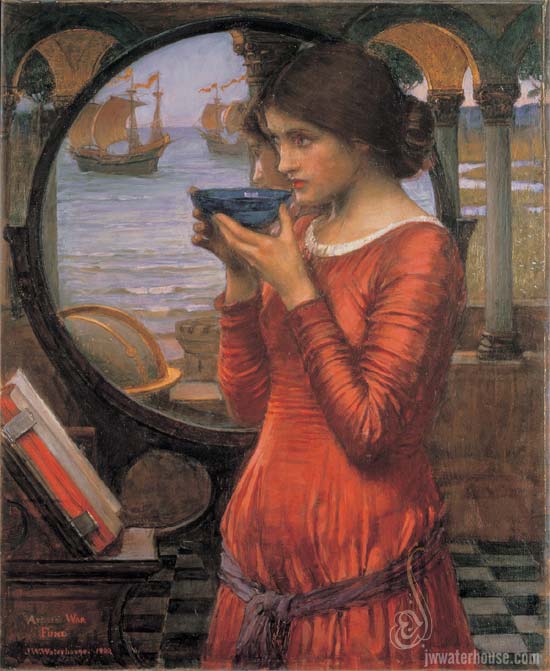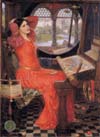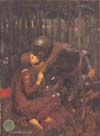
|
Actual Size (W x H): 55cm x 68.5cm [ 21.67" x 26.99" ]
 John William Waterhouse: Destiny - 1900
John William Waterhouse: Destiny - 1900
» View Larger Scan
» Create As Calendar
Painted in 1900. This picture was given to the Artists War Fund, in support of British casualties of the Boer War. The girl is drinking a toast to the departing warriors, whose ships can be seen in a mirror in the background. Once again the painter produces a highly attractive female, and moreover one of real flesh and blood, in contrast to the more stylised figures of Edward Burne-Jones, with whom his work is so often compared. The Italian origins of the painter’s art are also apparent.
The Boer Wars was the name given to the South African Wars of 1880-1 and 1899-1902, that were fought between the British and the descendants of the Dutch settlers (Boers) in Africa. After the first Boer War William Gladstone granted the Boers self-government in the Transvaal.
The Boers, under the leadership of Paul Kruger, resented the colonial policy of Joseph Chamberlain and Alfred Milner which they feared would deprive the Transvaal of its independence. After receiving military equipment from Germany, the Boers had a series of successes on the borders of Cape Colony and Natal between October 1899 and January 1900. Although the Boers only had 88,000 soldiers, led by the outstanding soldiers such as Louis Botha, and Jan Smuts, the Boers were able to successfully besiege the British garrisons at Ladysmith, Mafeking and Kimberley.
Army reinforcements arrived in South Africa in 1900 and counter-offences relieved the garrisons and enabled the British to take control of the Boer capital, Pretoria, on 5th June. For the next two years groups of Boer commandos raided isolated British units in South Africa. Lord Kitchener, the Chief of Staff in South Africa, reacted to this by destroying Boer farms and moving civilians into concentration camps.
The British action in South Africa was strongly opposed by many leading Liberal politicians and most of the Independent Labour Party as an example of the worst excesses of imperialism. The Boer War ended with the signing of the Treaty of Vereeniging in May 1902. The peace settlement brought to an end the Transvaal and the Orange Free State as Boer republics. However, the British granted the Boers £3 million for restocking and repairing farm lands and promised eventual self-government (granted in 1907).
Spartacus Education
© Image Copyright and Reproduction Information
|
|

 Well, I think so, Brain, but pantyhose are so uncomfortable in the summertime. - Pinky
Well, I think so, Brain, but pantyhose are so uncomfortable in the summertime. - Pinky

 Current Waterhouse Posters Promotion
Current Waterhouse Posters Promotion

|
|
 |







 Well, I think so, Brain, but pantyhose are so uncomfortable in the summertime. - Pinky
Well, I think so, Brain, but pantyhose are so uncomfortable in the summertime. - Pinky
 Current Waterhouse Posters Promotion
Current Waterhouse Posters Promotion
